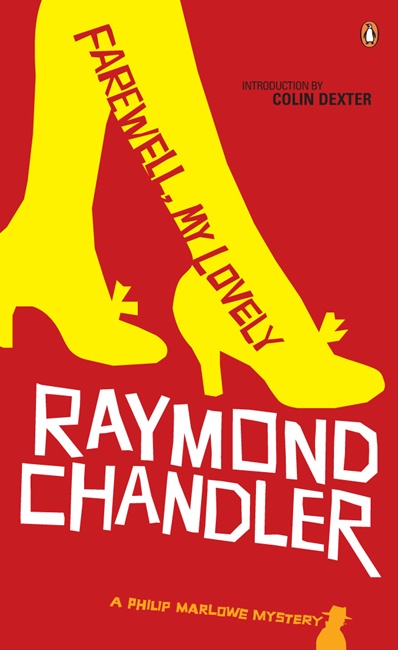|
Farewell, My Lovely

Farewell, My Lovely is the
second and perhaps the best known of Chandler's Philip Marlowe books
and while it wasn't a huge success when it was was first published
Farewell, My Lovely is now considered to be a hard-boiled pulp classic.
These books revolve around the hard-drinking loner private detective
Philip Marlowe - a streetwise and sharply dressed but rather broken
hero who has a vivid sense of the absurdity and harsh reality of life.
His sardonic first person observations and Chandler's prose still
crackle with life all these years later. Marlowe was everything that
Chandler hoped and feared he might be and the author would always
return to these books - even abandoning Hollywood to write more of them.
Despite his status as one of the
great American popular authors and his very American descriptive style,
Chandler was a man of many contradictions and believe it or not was
raised in England. Marlowe was actually named after Marlowe House at
Dulwich College where Chandler had studied as a young man. When he
returned to the United States (where he had been born), Chandler became
very interested in the progression of American-English and used it as
memorably as anyone in his twisty and enjoyable detective novels.
His turn of phrase and the
distinctive voice he gave Marlowe remains highly entertaining. "The
eighty-five cent dinner tasted like a discarded mail bag and was served
to me by a waiter who looked as if he would slug me for a quarter, cut
my throat for six bits, and bury me at sea in a barrel of concrete for
a dollar and a half, plus sales tax." The seamy underbelly of the
American dream, that booze sodden gaudy low-rent plastic neon lit world
of cheap bars and lonely streets was perfectly captured.
Farewell, My Lovely begins with
Philip Marlowe being offered a case by a hulking ex-convict named Moose
Malloy who has only recently come out of prison. Malloy is not the
ideal client or someone you'd go out of your way to meet or work for
but Marlowe hasn't had a case for weeks and so takes the assignment.
Malloy is looking for his old showgirl girlfriend Velma and Marlowe
begins his investigation by trying to work out who ran the club Velma
worked at in downtown Los Angeles. Marlowe draws a blank as the owner
has died and his widow doesn't recall a Velma and so he returns to his
office and mulls over how Malloy - who despite being almost childlike
at times is incredibly strong and not adverse to violence if the mood
takes him - will react. "He was a big man but not more than six feet
five inches tall and not wider than a beer truck."
However, another job soon lands
in his lap when the foppish Marriot hires the detective to accompany
him to Purissima Canyon. Marriot's girlfriend had some valuable jade
jewellery stolen but the thieves have apparently agreed to return it in
exchange for $8,000. Marlowe is not completely convinced by Marriot's
story but money is money and he can't afford to be turning down cases
at the moment. This is merely the start of what becomes an increasingly
complicated series of inter-locking events as Marlowe has to recover
the jewels and deal with a bizarre case involving crooked policemen,
racketeers, a psychic, an asylum and - of course - the formidable Moose
Malloy.
One of the brilliant things
about this story is the way that Chandler simultaneously makes it both
outlandish but grounded at the same time. Roger Thornhill has nothing
on Philip Marlowe and the sequence of events that our rough diamond
hero is drawn into are preposterous when placed alongside one another
but they are wonderfully dovetailed together and it somehow feels like
this could really happen to a threadbare private detective who takes
strange cases and isn't afraid of danger.
Like the Ian Fleming books, the
hero has a dark aspect to his character but also a sense of justice and
duty. While James Bond is loyal to his country above all else, Marlowe
is trying to make sense of the world. He is forced to confront its
ugliness and wants to make it a better place. Chandler actually knew
Ian Fleming - Marlowe and the literary James Bond being not a million
miles apart with their detached status in life and propensity for
danger, strong coffee and a lot of alcohol. Marlowe is a great
character. Paranoid, self-aware, intelligent, sarcastic, boorish,
independent, tough, sardonic, funny. "Randall and I took our hats off.
In that neighborhood that probably ranked you with Valentino." It's no
wonder that Chandler became one of the most parodied of authors.
Marlowe is no saint (he wouldn't
be any good as his job if he was) but he does have a sense of morality.
There is an undercurrent of racial tension in the story too that is
very much of the time. Use of slang (just like Fleming again) is dated
and not exactly politically correct today. Chandler has been accused of
retrospective racism but he wanted Marlowe to talk like a real person
would in that era. With a somewhat blunt wit and disdain for sham and
pettiness. I love Chandler's descriptions of the people Marlowe meets,
many of whom are of course grotesque and crooked. It makes the
characters come to life in vivid fashion. I like the introspective
nature of Marlowe too (perfectly illustrated by the fact that he plays
chess against himself).
"Twenty minutes' sleep. Just a
nice doze. In that time I had muffed a job and lost eight thousand
dollars. Well, why not? In twenty minutes you can sink a battleship,
down three or four planes, hold a double execution. You can die, get
married, get fired and find a new job, have a tooth pulled, have your
tonsils out. In twenty minutes you can even get up in the morning. You
can get a glass of water at a night club - maybe." Farewell, My Lovely
remains a very entertaining and well written book.
- Jake
c 2015
Alternative 007
|

|


